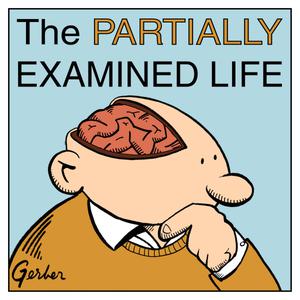
The Partially Examined Life Philosophy Podcast
Mark Linsenmayer
- 49 minutes 14 secondsEp. 359: Karl Marx's Project (Part One)
On the intro to Marx's Grundrisse (1857) and "Theses on Feuerbach" (1845). Why economics, and why do it the way Marx does? We see Marx argues that Feuerbach's materialism was not materialistic enough, start looking at production, consumption, distribution, and exchange as moments within a single process, and talk about why anyone would want to read a historical economic text.
Get more at partiallyexaminedlife.com. Visit partiallyexaminedlife.com/support to get ad-free episodes and tons of bonus discussion.
Sponsor: Get a $1/month e-commerce trial at shopify.com/pel.
20 January 2025, 6:58 am - 54 minutes 9 secondsPretty Much Pop #188: Vampire Appreciation
In light of Robert Eggers' film Nosferatu and the end of What We Do in Shadows, Mark, Lawrence, Sarahlyn, and Al discuss the many vampire shows and films all the way back to Bram Stoker's 1897 novel.
For more, visit prettymuchpop.com. Hear this ad-free with bonus content at patreon.com/prettymuchpop or by subscribing via Apple Podcasts to the Mark Lintertainment Channel.
Sponsors: Get 10% off your first month of online therapy at BetterHelp.com/pretty. Learn about LGBT stereotypes at gayishpodcast.com.
18 January 2025, 6:00 pm - 41 minutes 44 secondsEp. 358: Max Stirner's Egoism (Part Two)
Continuing on The Ego and Its Own, focusing now on the sections "The Owner" and "My Power." Stirner lets us know that his egoism ("ownness") is not compatible with liberal egalitarianism, which he sees as just a continuation of the Christian project of perfecting humanity.
Get more at partiallyexaminedlife.com. Visit partiallyexaminedlife.com/support to get ad-free episodes and tons of bonus discussion.
Sponsor: Learn about St. John's College at sjc.edu/pel.
13 January 2025, 6:06 am - 48 minutes 42 secondsEp. 358: Max Stirner's Egoism (Part One)
On The Ego and its Own (1844), another big influence on Karl Marx and a precursor of Nietzsche, or perhaps an early Ayn Rand.
Get more at partiallyexaminedlife.com. Visit partiallyexaminedlife.com/support to get ad-free episodes and tons of bonus discussion.
Sponsor: Have up to a $100 donation to effective charities matched at GiveWell.org.
6 January 2025, 5:53 am - 1 hour 18 minutesPEL Presents NEM#226: The Evolution of Iain Matthews (Fairport Convention, Southern Comfort, Plainsong)
Iain started in Britain's Fairport Convention in the late '60s, but quickly left that band to start a couple more and then move to the US for a lengthy solo career. He has in total released close to 50 albums, including many collaborations.
We discus the title track from How Much Is Enough (2024), the title track from God Looked Down (1996), and "Road to Ronderlin" by Matthews Southern Comfort from Later That Same Year (1970). End song: "St. Theresa’s Ghost" by Ian Matthews and the Searing Quartet, from Joy Mining (2008). Intro: "Book Song" by Fairport Convention from What We Did on Our Holidays (1969). Learn more at iainmatthews.nl.
5 January 2025, 6:00 pm - 1 hour 8 minutesPEL '24-'25 Transition Nightcap
Mark, Wes, Seth, and Dylan reflect on our past year of PEL recording, catch you up on our habits and interests, and talk about what might come next.
Get more at partiallyexaminedlife.com. Visit partiallyexaminedlife.com/support to this and every recording ad-free, plus numerous Nightcaps and many hours of other bonus content.
Learn about Mark's spring Core Texts in philosophy class at partiallyexaminedlife.com/class.
30 December 2024, 5:52 am - 53 minutes 19 secondsEp. 357: Feuerbach on the Evolution of Philosophy (Part Two)
We finally discuss Feuerbach's proposed post-Hegelian, materialist approach to philosophy in his "Principles of the Philosophy of the Future" (1843). How can a materialist framework support phenomena central to F's account like our immediate, indubitable recognition of our selves, each other, and love itself?
Get more at partiallyexaminedlife.com. Visit partiallyexaminedlife.com/support to get ad-free episodes and tons of bonus discussion, including a supporter-exclusive part three to this discussion.
Sponsors: Have up to a $100 donation to effective charities matched at GiveWell.org. Learn about St. John's College at sjc.edu/pel.
Learn about Mark's spring Core Texts in philosophy class at partiallyexaminedlife.com/class.
23 December 2024, 1:51 pm - 54 minutes 36 secondsPEL Presents PMP#187: Taking Down Santa Claus
For our annual holiday episode, Mark, Lawrence, Sarahlyn and Al talk about Santa qua mythical and cultural figure, getting into the history of the character, his film appearances, and how the emphasis on kids' belief compares to religious belief. Plus, grading Xmas movies on a curve and Black Santa!
For more, visit prettymuchpop.com. Hear this ad-free with bonus content at patreon.com/prettymuchpop or by subscribing via Apple Podcasts to the Mark Lintertainment Channel.
Learn about Mark's Core Texts in Philosophy class at partiallyexaminedlife.com/class.
22 December 2024, 6:00 pm - 59 minutes 19 secondsPEL Presents PvI#87: Mystic Toaster with Simon Critchley
Simon is a professor at New York's New School for Social Research and moderates the New York Times' philosophy offering, The Stone. He joins Mark and Bill to discuss his new book, On Mysticism: The Experience of Ecstasy, and we used the occasion to explore how art and mysticism might be connected, including engaging in improv rituals.
Hear more at philosophyimprov.com. Support the and hear this ad-free at podcast at philosophyimprov.com/support. Check out other Evergreen Podcast offerings.
21 December 2024, 6:00 pm - 49 minutes 14 secondsEp. 357: Feuerbach on the Evolution of Philosophy (Part One)
Mark, Wes, and Dylan continue to look at Ludwig Feuerbach's "Principles of the Philosophy of the Future" (1843), recounting his story about how increasingly mature notions of God should lead philosophy eventually to a materialism where the sensual is the real.
Get more at partiallyexaminedlife.com. Visit partiallyexaminedlife.com/support to get ad-free episodes and tons of bonus discussion.
Sponsors: Have up to a $100 donation to effective charities matched at GiveWell.org. Check out the Constant Wonder podcast
Learn about Mark's spring Core Texts in philosophy class at partiallyexaminedlife.com/class. Buy the PEL book for someone cool at partiallyexaminedlife.com/book.
16 December 2024, 1:13 pm - 47 minutes 52 secondsPEL Presents Subtext: The Sublime Mundane in Conrad Aiken’s “Morning Song of Senlin” (Part 1)
Where the repetitions of ordinary life threaten to overwhelm any sense of the sublime, the poet Conrad Aiken seems to suggest that they can be transformed into a way of being connected to it. The mundane order is, after all, just a part of the cosmic. When we get ready to go to work, it is on a “swiftly tilting planet” that “bathes in a flame of space.” The sun is “far off in a shell of silence,” but its light decorates the walls of our homes. We might wonder, in light of modernity’s crisis of faith, if the sublime is meant to replace the divine, and if so whether what Aiken calls “humble offerings” to a “cloud of silence” are enough. Wes & Erin discuss Aiken’s “Morning Song of Senlin,” and whether humanity’s religious impulses can be fully compensated with an aesthetic or ironic relation to nature and cosmic scale.
14 December 2024, 6:00 pm - More Episodes? Get the App
Your feedback is valuable to us. Should you encounter any bugs, glitches, lack of functionality or other problems, please email us on [email protected] or join Moon.FM Telegram Group where you can talk directly to the dev team who are happy to answer any queries.
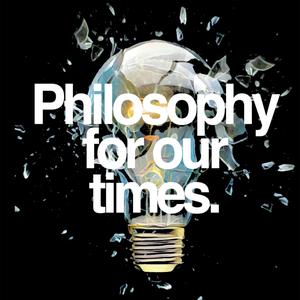 Philosophy For Our Times
Philosophy For Our Times
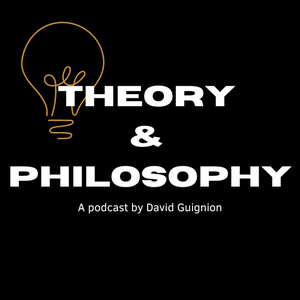 Theory & Philosophy
Theory & Philosophy
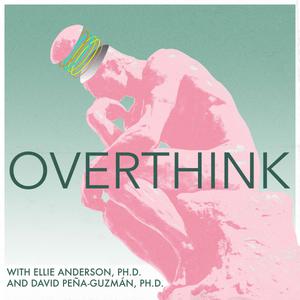 Overthink
Overthink
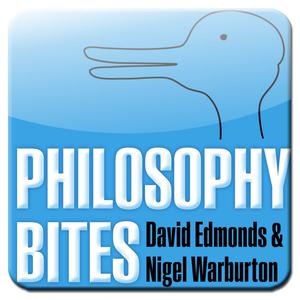 Philosophy Bites
Philosophy Bites
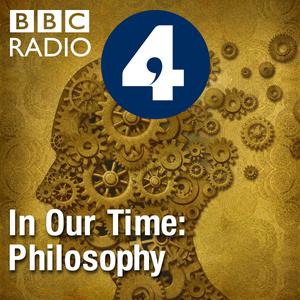 In Our Time: Philosophy
In Our Time: Philosophy
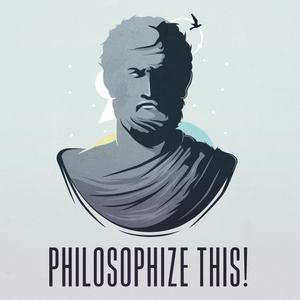 Philosophize This!
Philosophize This!